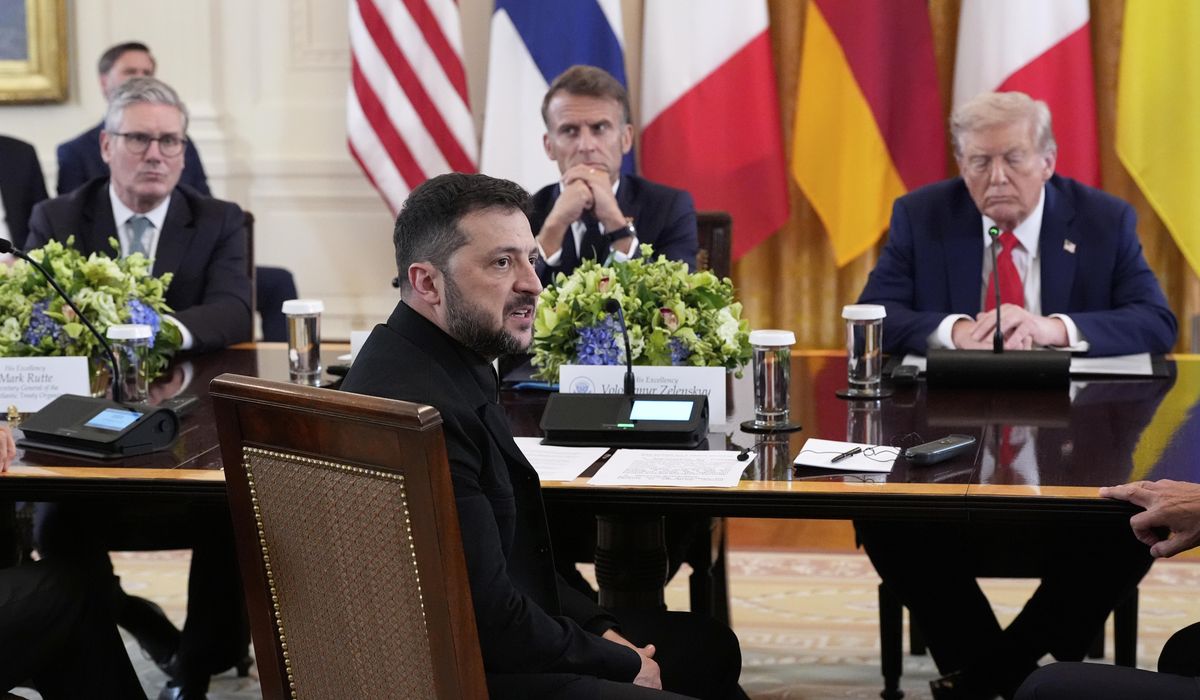


Neither Russia nor Ukraine is scoring significant wins on the battlefield and the war between those two countries, now well into its fourth year, will only end at the negotiating table, said U.S. Ambassador to NATO Matthew Whitaker.
In an exclusive interview with The Washington Times’ Tim Constantine, Mr. Whitaker underscored President Trump’s unwavering commitment to facilitating an end to the conflict, despite his public frustration this week that a long-awaited meeting between Russian President Vladimir Putin and Ukrainian President Volodymyr Zelenskyy still hasn’t materialized.
Mr. Whitaker’s comments highlight what has become increasingly apparent to military insiders and national security analysts: Short of some unexpected game-changer, there’s little expectation for a major shift on the battlefield in favor of either side.
“It’s not just death and destruction on the front line. It’s in the cities in Ukraine, and I think a lot of what Russia talks about when they talk about the reasons for their invasion of Ukraine is all pretext,” Mr. Whitaker said. “They just didn’t want a Ukraine that was Western-looking. They didn’t want it to be part of NATO, didn’t want it to be part of the [European Union], didn’t want it to be part of Europe. And so they decided that they would make a move on that.”
“It’s been going on too long,” Mr. Whitaker said of the war. “There are no battlefield gains. It’s not going to be won on the battlefield. It’s going to be won at the negotiating table. And so President Trump continues to create circumstances to bring both sides closer.”
Mr. Whitaker stressed that Mr. Trump’s personal style of “energetic diplomacy” could be the key to reaching a deal. That style was on full display last month when Mr. Trump met face to face with Mr. Putin in Alaska and, several days later, with Mr. Zelenskyy and other European leaders at the White House.
Mr. Trump came away from those meetings pushing harder than ever for the two leaders, Mr. Putin and Mr. Zelenskyy, to meet in person. But the president conceded this week that such a meeting isn’t on the immediate horizon, nor is a deal between the two men.
“I’ve been watching it, I’ve been seeing it, and I’ve been talking about it with President Putin and President Zelenskyy,” Mr. Trump told CBS News. “Something is going to happen, but they are not ready yet. But something is going to happen. We are going to get it done.”
In the meantime, Mr. Whitaker lauded the new weapons pipeline established by the administration. Under the new system, the U.S. sells weapons to NATO and its member countries, and the arms are then passed on to Ukraine.
Mr. Whitaker said that system, along with Mr. Trump’s ability to engage with adversaries, are key differences between this president and his predecessor, former President Joseph R. Biden.
“When Joe Biden was in office, the American people were writing the checks for this war, for Ukraine to fight this war. There was no rare earth minerals deal with Ukraine. The [American] taxpayer was just on the hook,” Mr. Whitaker said. “And since President Trump has been there, not only are we talking to Putin … but we’re also, more importantly, our European allies together with Canada here in NATO, are paying for this war by buying American armaments” and helping create American jobs.
Those arms, he said, remain “the best in the world” and are crucial to Ukraine’s defenses even as the administration works to secure a lasting peace deal.
Amid the administration’s ongoing peace push, European leaders met in Paris on Thursday to discuss the details of “security guarantees” that European nations can provide Ukraine once a ceasefire is reached.
Those guarantees are expected to include the presence of European ground troops inside Ukraine as a way of warding off any future Russian aggression.
Mr. Trump has ruled out sending U.S. ground troops as part of the effort, but hasn’t ruled out American air support or other assets.
Across Europe, Mr. Whitaker said, leaders are asking what U.S. security commitments and military deployments will look like in the future, especially as Washington increasingly turns its foreign policy and military focus toward China.
“They’re obviously very interested as to how the United States is going to deploy in the future,” Mr. Whitaker said of European leaders.
• Ben Wolfgang can be reached at bwolfgang@washingtontimes.com.
